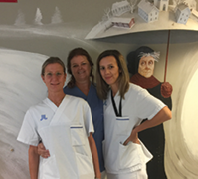“There aren’t many comparative studies of children with JIA across different countries, but if you look at national data for physical activity of children in general, Scandinavian children tend to have higher activity compared with children in the United States,” Dr. Iversen notes.
This comparative study will contribute to Dr. Iversen’s long-range research on outcome measures to better quantify the intensity of physical activity, measured using questionnaires and fitness trackers. She says her ultimate goal with all of this research is to “ensure children with JIA are as physically fit as possible within the constraints of their disease to reduce the risk of physical complications long term.”
Making a Cultural Connection

Dr. Maura Iversen and colleagues at the Astrid Lindgren Children’s Hospital in Stockholm.
A primary goal in fulfilling a Fulbright Scholarship is to learn from the unique cultural and academic aspects of a country outside of the U.S., and Sweden is providing Dr. Iversen with many opportunities to fulfill this goal.
Through her work with research colleagues in Sweden, Dr. Iversen has experienced cultural events, such as the Midsummer Festival, and has had the opportunity to meet with other physical therapists and rheumatology researchers to think about spinout studies on different types of interventions to measure and promote physical activity.
She also has observed Swedes living and moving in their communities, noting, “the level of physical activity in general is much higher than you would observe in New England.” She continues to find Swedish patients and their parents very involved and willing participants in research.
“Where there are definite cultural differences on physical activity between Sweden and the United States, there are also similarities for practitioners and patients, including a focus on linking research to practice,” Dr. Iversen acknowledges. “I see in Sweden how having a patient organization intrinsically linked to research data and implementation can support more timely application of this research to improve patient care.”
As she thinks about applying what she has learned through research and cultural immersion in Sweden with her patients and the rheumatology community in Boston and the U.S., Dr. Iversen sees a clear path. This path includes asking children with JIA more direct questions. It also includes finding new ways to quantify and measure intensity of physical exercise to improve the lives of all patients with rheumatic conditions.
Her special focus is for the youngest patients living with JIA, who—like her daughter—need the courage and skills to exercise with confidence as they live with an “old person’s disease,” so they have every opportunity to build their best life.

